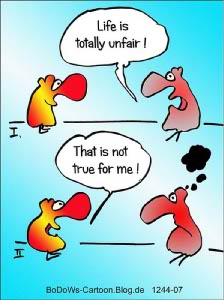 How does one deal with unfair behaviors? Today, there is unique neurobiological evidence to account for individual differences of reaction to unfairness. This subject has long been investigated by various disciplines including philosophy, psychology, economics, and biology. However, our reactions to unfairness differ from one individual to another.
How does one deal with unfair behaviors? Today, there is unique neurobiological evidence to account for individual differences of reaction to unfairness. This subject has long been investigated by various disciplines including philosophy, psychology, economics, and biology. However, our reactions to unfairness differ from one individual to another.
Experimental economics studies using the ultimatum game (UG), in which players must decide whether to accept or reject fair or unfair offers, have also shown that there are substantial individual differences in reaction to unfairness. We combined a molecular imaging technique, an economics game, and a personality inventory to elucidate the neurobiological mechanism of heterogeneous reactions to unfairness.
Contrary to the common belief that aggressive personalities (impulsivity and anger–hostility) are related to a high rejection rate of unfair offers in UG (6–8), we found that individuals with apparently peaceful personalities (straightforwardness and trust) are more likely to reject and retaliate against unfairness. Furthermore, straightforwardness and, to a lesser extent, trust personalities mediated our finding that individuals with low 5-HTT in DRN were more likely to reject unfair offers.

Straightforwardness is similar to honesty and implies directness and frankness in dealing with others. Trust can be defined as the general expectation of others (16, 17). Honesty is correlated with trust (18, 19), and honest and trustful persons tend to believe that most people are honest, decent, and trustworthy (17). Thus, honest and trustful persons have a higher normative expectation, a standard of behavior that they believe people should comply with. Perception of fairness depends on normative expectations, and in fact, people with higher normative expectations tend to reject more unfair offers in UG (20).
The opposite pole of straightforwardness/honesty and trust is Machiavellianism (17, 19). Machiavellian individuals are cunning, unscrupulous, and opportunistic and behave adroitly to attain particular goals. They are generally more likely to suspect others of dishonesty (cynicism) (1). Machiavellian intelligence (also known as political intelligence or social intelligence) is hypothesized to have evolved through social complexity, in which individuals developed sophisticated strategies with a balance of competition and cooperation to achieve higher social and reproductive success (21–23). It has been shown that Machiavellian individuals accept unfair offers more in UG (24). This means that Machiavellian people with realism and opportunism behave to maximize their self-interest. However, honest and trustful persons cannot easily separate themselves from moral precepts and tend to adhere to a norm of fairness and consequently show lower tolerance of unfairness (24, 25). It should be noted that, because we did not measure Machiavellianism, our extrapolative arguments on it should be directly tested in future studies.
In other words, higher central serotonin transmission might allow us to behave adroitly and opportunistically, being good at playing games while pursuing self-interest. However, little is known about psychological as well as neurobiological mechanisms of this observation.
Source: http://www.pnas.org/content/109/11/4281.full
This article contains supporting information online at www.pnas.org/lookup/suppl/doi:10.1073/pnas.1118687109/-/DCSupplemental.
Correspondence should be addressed to: This email address is being protected from spambots. You need JavaScript enabled to view it.
References
1. Gunnthorsdottir A, McCabe K, Smith V (2002) Using the Machiavellianism instrument to predict trustworthiness in a bargaining game. J Econ Psychol 23:49–66.
...
6. Pillutla MM, Murnighan JK (1996) Unfairness, anger, and spite: Emotional rejections of ultimatum offers. Organ Behav Hum Decis Process 68:208–224.
7. Emanuele E, Brondino N, Bertona M, Re S, Geroldi D (2008) Relationship between platelet serotonin content and rejections of unfair offers in the ultimatum game. Neurosci Lett 437:158–161.
8. Mehta PH, Beer J (2010) Neural mechanisms of the testosterone-aggression relation: The role of orbitofrontal cortex. J Cogn Neurosci 22:2357–2368.
...
16. Rotter JB (1967) A new scale for the measurement of interpersonal trust. J Pers 35:651–665.
17. Costa P (1991) Facet scales for agreeableness and conscientiousness: A revision of the NEO personality inventory. Pers Individ Dif 12:887–898.
18. Yamagishi T, Yamagishi M (1994) Trust and commitment in the United States and Japan. Motiv Emot 18:129–166.
19. Ashton M, Lee K, Son C (2000) Honesty as the sixth factor of personality: Correlations with Machiavellianism, primary psychopathy, and social adroitness. Eur J Pers 14:359–368.
20. Bicchieri C, Chavez A (2010) Behaving as expected: Public information and fairness norms. J Behav Decis Making 23:161–178.
21. Humphrey N (1976) in Growing Points in Ethology: The Social Function of Intellect, eds BatesonPPG, HindeRA (Cambridge Univ Press, Cambridge), pp 303–317.
22. De Waal F (1982) Chimpanzee Politics: Power and Sex Among Apes (Johns Hopkins Univ Press, Baltimore).
23. Byrne R, Whiten A (1988) Machiavellian Intelligence: Social Expertise and the Evolution of Intellect in Monkeys, Apes, and Humans (Oxford Univ Press, Oxford).
24. Meyer H (1992) Norms and self-interest in ultimatum bargaining: The prince's prudence. J Econ Psychol 13:215–232.
25. Harrel W (1980) Retaliatory aggression by high and low Machiavellians against remorseful and non-remorseful wrongdoers. Soc Behav Pers 8:217–220.






